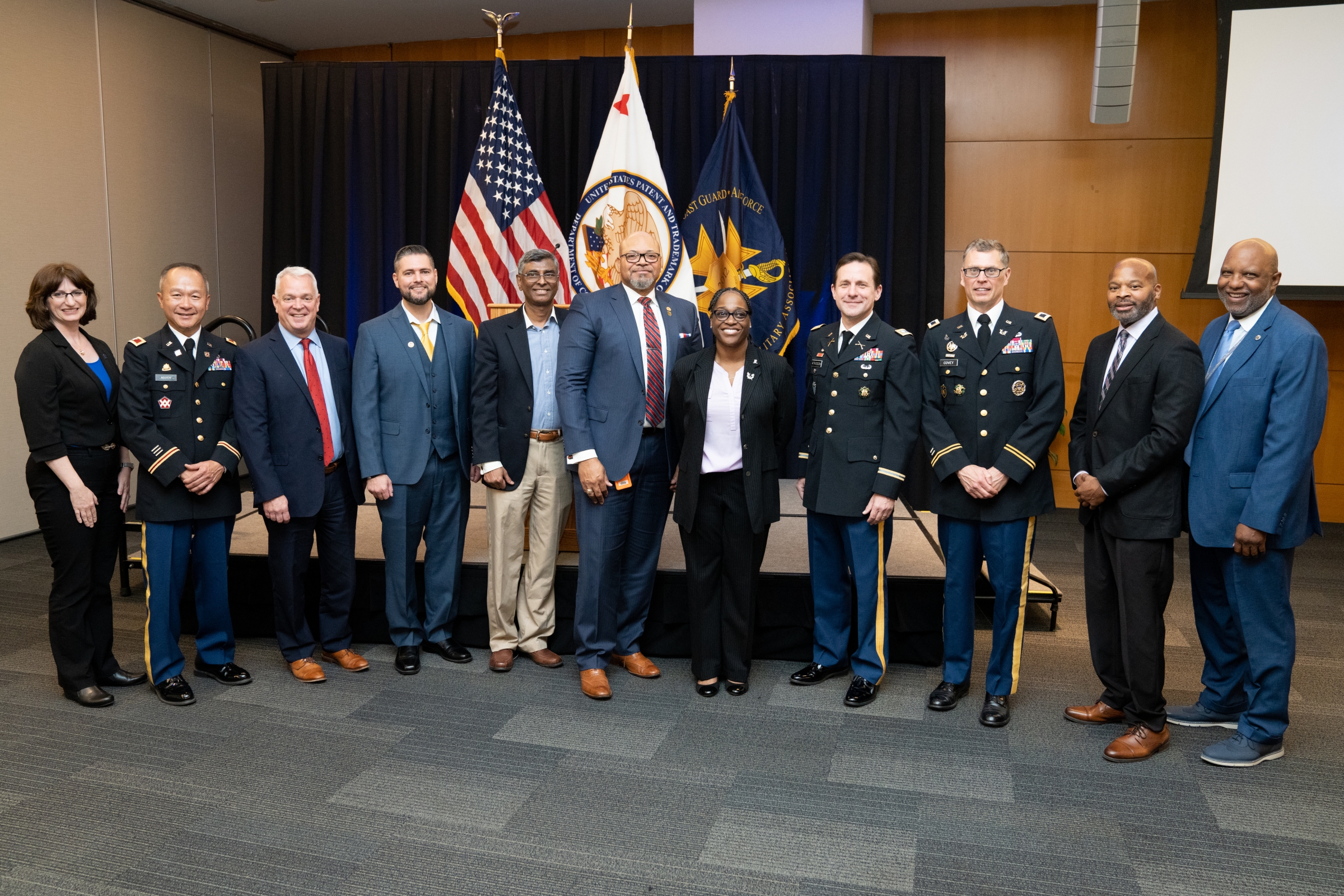The USPTO Military Association (UMA) celebrated Veterans Day Nov. 9, 2023 with its annual Veterans Day event. The celebration featured a luncheon, a musical performance by the Patenteers USPTO chorus, remarks from leaders, and guest speaker Lt. Col. Eric Atkisson, USA (Retired), the agency’s communications division manager.
Veterans Day honors America’s veterans for their willingness to serve and sacrifice for the nation, and the UMA planned a program with numerous agency veterans sharing their experiences and viewpoints. The Patenteers performed songs like “America the Beautiful” and “God Bless America,” as well as all the service songs, inviting audience members to stand and sing along during their respective service song.
After welcome remarks by UMA president Alford Kindred, the audience enjoyed comments from UMA executive advisor and USPTO Chief Administrative Officer Fred Steckler, who explained that the Veterans Day event has become an agency tradition, starting with the formation of the UMA in 2012. Since its beginning, the group has sought to support veterans while raising awareness of military and veteran service in the agency, he said.
“Our commitment [to veterans] extends beyond the walls of the PTO,” said Steckler, a Navy veteran, highlighting the various partnerships and volunteer endeavors the UMA regularly participates in.
Derrick Brent, Deputy Director of the USPTO, followed Steckler and offered heartfelt thanks to all those who “answer the call to serve.” Although not a military veteran, Brent shared that both of his parents are Air Force veterans and he is “honored to work at an agency with a truly vibrant veteran community.” He also shared the story of Civil War veteran Charles Gould, who continued to serve his nation as a patent office employee following Army service. Gould was both a Medal of Honor winner and a patent holder.
Next, Army retiree and Patent Trial and Appeal Board, Board Executive Troy Tyler took the stage to address our “why”—the importance of maintaining the “premier all-volunteer fighting force in the world.”
“We can’t lose sight of that,” he urged, citing both the dwindling number of American military veterans and the recruiting shortfalls all military service branches are experiencing.
Tyler shared several personal experiences from his own transition from military to civil service, including people who didn’t understand why veterans get hiring preference in the federal government. He discussed the hardships and sacrifice that so many service members willingly endure, from deployments to missed birthdays, and explained, “That’s why you should thank a veteran. […] Every veteran deserves thanks. We live free, we live safely, and there’s no better country in the world to do it.”
UMA vice president and Army veteran Michael Argüello highlighted the POW/MIA table. If you are unfamiliar with this military tradition, learn about it.
The event guest speaker, Lt. Col. (Retired) Atkisson, was one of the founding members of the USPTO Military Association. He joined the Army at age 17 and was deployed in support of Operation Desert Storm at age 18. He served in the military for 25 years and now oversees a communications team of 25 people at the USPTO. His presentation, titled “A Tale of Two Veterans,” served to showcase the necessity of recording veteran stories.
Atkisson focused on the experiences of two individuals—Al Dietrick and Morris McCullough. The former was a World War II veteran that Atkisson interviewed when Dietrick was 86. The latter was Atkisson’s own grandfather, who didn’t talk about his service; “What little he might have shared with others about his service in two world wars was lost to time,” said Atkisson. The difference between the impressions left behind by each relate directly to the stories they shared. He elaborated:
On the one hand you have Al, who at some point late in life began to open up about his experiences in the Second World War. And when he did, there were people there to listen. And record. And write. I was privileged to be one of them, but I was only one of many.
Now, Al’s stories live on. They will outlive all of us. They will be remembered, maybe even quoted in future books and documentaries. To add texture and new firsthand accounts of the battles he was in, the things he experienced. Grandpa Mac, on the other hand, seems to have rarely talked about the war with family, other than a few odd details shared with his grandchildren, most of which they would later forget. No one ever attempted to write down or record the stories he may have had–stories that will forever remain unknown and untold. All we have is my one half-forgotten child’s memory of hearing him talk about the Red Baron.
The moral to the story, explained Atkisson, is to capture the memories and experiences of veterans before it’s too late. “If you have a veteran in your life, get them to share their stories. Record them, write them down. Build a bridge across that gulf between you. If you are a veteran, don’t wait to be asked. That bridge – it goes both ways. There is no better time of year than the present and no better day of the year than Veterans Day to remind ourselves of this,” he said.
As for what military service means to him, Atkisson said, “It means that I was part of something bigger and better than myself, something important and good that included Al, Grandpa Mac, and millions of others, including some of you here with us today and watching from home. Something ennobling that lifts us all up, no matter how mean or humble the circumstances from which we came.”
And that’s something that I think all veterans can identify with.
